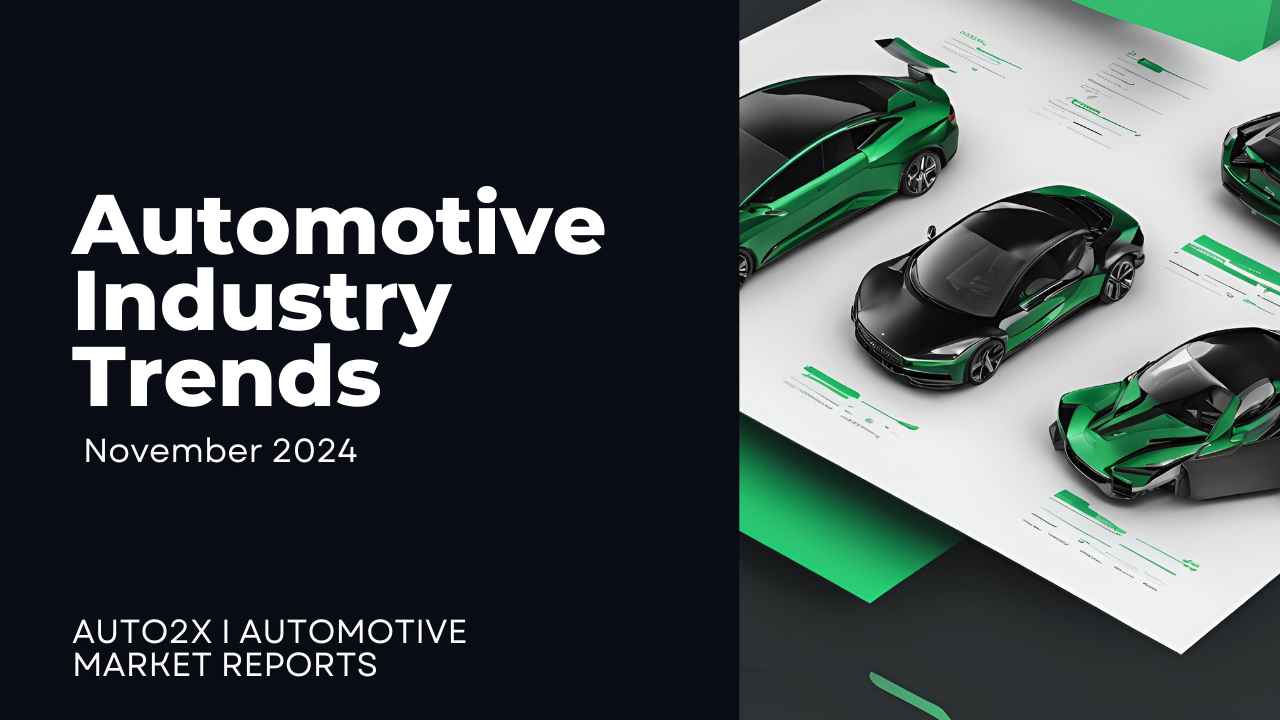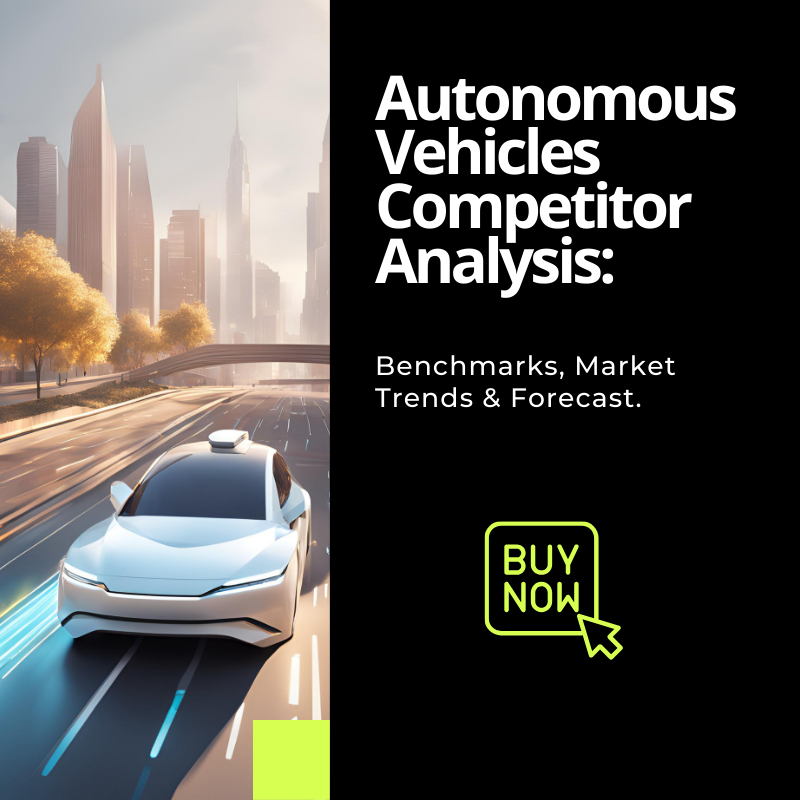Welcome to the monthly review of Automotive Industry Trends shaping the future of technology.
In this article, we analyse market trends, battlefronts and innovations from +350 announcements, product launches, collaborations, investments and regulation in November 2024.
Companies that can navigate the automotive industry trends effectively, invest in innovation, and collaborate are poised to lead the new era of smart and sustainable mobility.
This analysis is powered by Current, which helps you identify automotive industry trends and turn them into action.
Automotive Industry Tracker November 2024
Here is a snapshot of what happened in electric cars, ADAS and autonomous, AI in automotive, connectivity and new mobility business models in November.
This analysis is powered by Current, which automates technology tracking and signal identification to help you innovate and tap into growth opportunities.
Artificial Intelligence in the Automotive Industry
The integration of AI in the automotive sector is moving rapidly to optimise vehicle design, digitalise manufacturing, enhance product development and improve customer experiences, among others.
AI to Optimise Manufacturing Efficiency
Lear Leverages AI for Shop Floor Efficiency.
Lear Corporation’s deployment of Palantir Foundry1 to build a large language model (LLM)-powered mobile app highlights AI’s transformative impact on manufacturing. This solution enables real-time issue identification and resolution on the shop floor, streamlining operations and boosting productivity.
Furthermore, investments in infrastructure for AI and hardware tailored to the automotive industry are on the rise.
Development of AI Chips for Automotive Applications is on the Rise
OEMs, automotive suppliers and tech companies are racing to develop in-house chips to optimize costs and performance for automotive AI applications.
The demand for AI-capable hardware is high, as demonstrated by AMD’s strong growth in data centres.
AMD doubled the revenues of its data centre division in the September quarter, which includes AI graphics processors. AMD posted record data center revenues of $3.5 billion for Q3 2024, representing a year-over-year (YoY) increase of 122 percent2.
- XPENG’s Turing Chip: XPENG introduced its in-house AI chip, aligning with a broader industry push toward developing proprietary silicon for autonomous driving and ADAS.
- AMD and AI Chips Surge: AMD’s focus on AI-specific chips reflects growing demand for high-performance processing, enabling faster machine learning tasks critical for autonomy.
- Intel debuts Automotive dGPU: Intel’s launch of a discrete GPU tailored for automotive signals a pivot to enable richer in-car experiences and advanced vision processing.
Proprietary AI Chips vs. Outsourcing
Developing proprietary AI chips internally could help optimize for specific vehicle applications and autonomy. Tesla has build their own custom-designed chip for Full Self-Driving, called FSD chip. XPeng’s Turing Chip is focused on ADAS and autonomous driving capabilities.
Other other hand, Volkswagen uses third-party solutions (NVIDIA) but explores proprietary capabilities via its software division, CARIAD. BMW leverages external partners like Qualcomm while co-developing algorithms and customizations in-house.
Survey on Business Adoption of AI
IBM’s “AI in Action” report underscores how leading businesses are embracing AI to enhance decision-making, improve operational efficiencies, and gain competitive advantages.
Automotive players integrating such strategies are better positioned to thrive in an AI-driven market.
Ethical AI is on the rise for Regulatory Compliance
Adherence to global AI regulations is becoming a critical consideration for sustaining innovation while managing risks.
The EU AI Act3 took effect in August 2024, increasing the pressure automotive companies face to ensure compliance with ethical and transparent AI practices.
At the same time, there is a big surge in the interest for Ethical AI.
A 1011% rise in searches for “AI ethical issues” over five years underscores the growing public and industry focus on accountability in AI applications.
Level-Up ADAS & Autonomous Driving
While innovation in ADAS and Automated Driving is progressing, regulatory compliance becomes stricter.
Ford is facing a civil penalty of $165M, the second-largest civil penalty in NHTSA’s history after Takata airbags, for slow-walking a 2021-2022 recall involving defective rearview cameras on its vehicles.
Embedded Vision Systems and Deep Learning for Full-Autonomy
Embedded vision systems are integrating deep learning into imaging, crucial for applications like object recognition and environment mapping in autonomous vehicles. This represents a leap forward for AI-powered perception in the automotive industry.
Strategic Partnerships to Develop Autonomous Electric Vehicles
A joint venture between Mitsubishi and Nissan aims to integrate autonomous driving technologies with advanced EV batteries, indicating growing cross-sector collaboration for next-gen mobility solutions.
Lyft partnered with Nexar and Mobileye to leverage real-time data and ADAS to enhance its autonomous ride-hailing capabilities.
Tele-operation and Remote Support and AI-Driven Safety
SoftBank unveiled AI solutions for remotely monitoring and assisting autonomous vehicles, enhancing public confidence in driverless technology.
In addition to Softbank, other automotive players are exploring tele-operation to improve safety of their autonomous driving. Tesla is reportedly looking for to form a tele-operation team for its Cybercab.
Learn more about disruptive automotive industry trends in autonomous vehicles here4.
Automotive Industry Trends in Connectivity
More Carmakers Embrace Features-on-Demand (FoD) to Boost New Revenues
Hyundai launched the Ioniq 9 BEV which offers FoD for lighting configurations and content streaming, allowing customization post-purchase.
Collaborations to Driving Innovation in Software-Defined Vehicles
New collaborations between traditional automakers and new entrants to accelerate software innovation is one of the key automotive industry trends.
Volkswagen Group and Rivian joined forces in a Joint Venture to bring next-generation electrical architecture and best-in-class software technology for both companies’ future electric vehicles, covering all relevant vehicle segments, including subcompact cars.
Electrification, Hydrogen and Alternate Fuels
Concerns over Europe’s EV Market Amid Weak Macro and Micro Outlook
Weak growth and global trade risks, such as the EU-China trade dispute could reshape EV market dynamics, affecting pricing and availability while creating uncertainty for automakers relying on global supply chains.
The European EV market is facing challenges from the introduction of affordable Chinese EVs and the slow movement towards EV battery and cell independence, as demonstrated by Northvolt’s bankruptcy in the U.S.
Valeo will cut 1,000 jobs across Europe amid automotive sector challenges.
Collaborations are crucial to bring efficiency and scalability in vehicle energy management systems as demonstrated by Stellantis and Infineon collaborating on power architecture for Stellantis EVs.
US Leadership Rankings: GM Becomes Leading EV Maker
GM surpassed 300,000 EV sales in the U.S., securing its position as the domestic leader in EV adoption, driven by its diversified portfolio of electric models like the Bolt, Hummer EV, and Cadillac Lyriq.
Innovations in Solid State Battery Technology
Honda unveiled a demonstration production line for all-solid-state batteries at its Japan R&D facility, with commercial rollout targeted for the late 2020s. This breakthrough aims to deliver higher energy density, faster charging, and improved safety, addressing critical EV market needs.
Advancements in Fuel Technology
- Horizon’s 400 kW Fuel Cell System: Horizon Fuel Cell Technologies has unveiled a high-power 400 kW fuel cell system, showcasing its potential for heavy-duty applications like trucks and buses, furthering the shift toward hydrogen as a viable alternative energy source.
- Sandia and Toyota Explore MTG Fuels: Research into the knock propensity of methanol-to-gasoline (MTG) fuels could provide low-carbon solutions to power hybrid systems, demonstrating continued interest in bridging fossil fuels with sustainable alternatives.
The integration of AI from EVs to AVs, design and manufacturing and vehicle interiors, partnerships and investments in SDV are some of the automotive industry trends in the end of 2024.
These automotive industry trends showcase the focus on innovation, partnerships and investments to progress autonomous driving, democratise electrification, and navigate global challenges.
As the automotive industry transitions toward autonomy, connectivity, electrification and sustainability, managing geopolitical challenges and scaling cutting-edge technologies will be crucial for future growth.
Learn about innovative technologies coming in 2025 here5.
To better understand the impact of emerging Automotive Industry trends subscribe to Current or check our reports.

